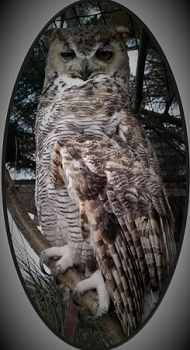While The Caregiver’s Voice features Voices with Dementia, there are many whose voices are unheard because they are not yet ready to share with the world that they have been diagnosed with dementia. Among these are a handful of people who are willing to add their voices to help raise awareness but wish to keep their identity private. One of these wrote the following. For ease of reference, we’re calling the author, Owlie.
 I am an owl, peering out at you, invisible in this darkness. I see and hear more than people suspect I do, and I am much wiser than people think I am – being an owl and all. The darkness I live in comes from two sources. You see, I have dementia, and the world is all “in the dark” about what that means.
I am an owl, peering out at you, invisible in this darkness. I see and hear more than people suspect I do, and I am much wiser than people think I am – being an owl and all. The darkness I live in comes from two sources. You see, I have dementia, and the world is all “in the dark” about what that means.
The true me is never seen because once the word dementia is attributed to me, all people can see is the disease, that it is fatal. They imagine a person bedridden, nonverbal and incontinent. They cannot see the person for fear of the disease.
Not being known as a real person hurts. I am not preparing to die. I do not see myself as a victim or a sufferer.
Being invisible makes me a very lonely old owl.
To feel more like a “normal” person (whatever that means), I go incognito into the world. That is, I pass for normal if I can. When I’m passing, I get a better sense of who others think I really am. Multiple levels of relationship are still possible. But when I tell people I have dementia, peculiar things happen.
With “professional” caregivers, a “lace curtain” descends, forever separating us from just being real people. I hate that.
One time I met with the owner of an adult day care facility to give her a brochure about some online resources for her clients and their partners. My brochures were in full color and professionally printed at great expense.
The adult day services owner took the brochure to look it over. Then I made the mistake of telling her that I had dementia. She put my brochure down on the table and down fell the lace curtain that would divide us forever. She put on her professional provider face and said brightly, “Oh, that’s OK. You know you can talk to me about anything… even sex!”
 How very inappropriate of her, and how disappointing. I realized she could have never let me out of that “person with dementia” box she had put me in. I could never be treated as a friend or a colleague or even just a neighbor without the dementia label.
How very inappropriate of her, and how disappointing. I realized she could have never let me out of that “person with dementia” box she had put me in. I could never be treated as a friend or a colleague or even just a neighbor without the dementia label.
I became just a person with dementia.
This is why this person with dementia stays in the closet about it. Call me Owlie. Maybe I can give you some insight into the person with dementia you care for.








